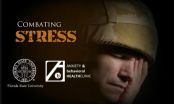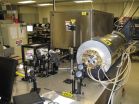(Press-News.org) TALLAHASSEE, Fla. -- A group of psychology researchers at Florida State University have developed a simple computer-based approach to treating anxiety sensitivity, something that could have major implications for veterans and other groups who are considered at risk for suicide.
"We have been using computer-delivered interventions for many years now in an effort to more efficiently deliver effective treatments," said psychology Professor Brad Schmidt, director of the Anxiety and Behavioral Health Clinic. "This study gives us evidence that a brief intervention may help to prevent suicide risk."
The study, appearing in the December issue of the Journal of Consulting and Clinical Psychology by the American Psychological Association, shows how Schmidt developed a treatment by focusing more on fears of losing control of one's thoughts and sanity.
The team established a fully computerized treatment that does not require a therapist or other mental health specialist, only access to a computer.
The new intervention, called the Cognitive Anxiety Sensitivity Treatment, or CAST, is a 45-minute treatment that contains videos, interactive features and true-false questions designed to make sure the patient understands the topic.
The program explains that symptoms such as racing thoughts, the inability to concentrate and others are not dangerous and not an indication that something bad is about to happen. It also provides users with exercises that they can practice to improve responses to stress and anxiety.
To test the computer-based treatment, Schmidt and his colleagues recruited 108 subjects who had above-average anxiety sensitivity. Half were given the CAST program, while the other half spent 45 minutes going through a computer-based lesson on the importance of a healthy lifestyle. The volunteers were tested for anxiety sensitivity levels before and after the sessions, as well as one month later.
The volunteers who got the CAST training saw their anxiety sensitivity scores drop significantly and by much more than the volunteers who learned about healthy living. More importantly, the decrease in anxiety sensitivity brought about by the computer method was very similar to the decreases seen in many earlier trials done with therapists. The therapist-based trials, however, were very intensive, with much more time spent in the therapist's office.
Schmidt and his colleagues said the new research can have huge implications in treating people who are at risk for suicide.
One group in particular who stands to benefit from the new treatment option is members of the military and veterans, who are at an increased risk for suicide but often avoid seeking help from psychologists or other clinicians because of the perceived stigma.
"Traditional psychotherapy is expensive, requires highly trained personnel and is unfortunately associated with a negative stigma for a lot of individuals," said Aaron Norr, a doctoral student working with Schmidt. "This means that a large number of people dealing with suicidal ideation won't get the help they need for a variety of reasons. That is why this intervention has so much potential. Hopefully this delivery platform will allow us to reach these individuals in need who would otherwise fall through the cracks."
Although the study was not large enough or long enough to analyze completed suicides among the subjects, CAST training appears to be effective in lowering suicide risk. Psychologists know that people with heightened anxiety sensitivity are at a greater risk for suicide, and they suspect that the link is related to the increased depression that can result from heightened anxiety sensitivity, so decreasing anxiety sensitivity should help lower suicide risks.
Future work by the group will focus on testing the effectiveness of CAST training in a larger sample using neurophysiological measures to examine how the training affects brain systems. Furthermore, the group plans to improve CAST by adding components that address other suicide-related issues, such as feelings of isolation and being a burden on others.
INFORMATION:
Other authors on the paper include doctoral students Daniel Capron, Amanda Raines and Nicholas Allan.
This work was in part supported by the Military Suicide Research Consortium (MSRC), an effort supported by the Office of the Assistant Secretary of Defense for Health Affairs under Award No. (W81XWH-10-2-0181). Opinions, interpretations, conclusions and recommendations are those of the author and are not necessarily endorsed by the MSRC or the Department of Defense.
VIDEO:
A new time-lapse animation of data from NOAA's GOES-West satellite provides a good picture of why the U.S. West Coast continues to experience record rainfall. The new animation shows the...
Click here for more information.
A new time-lapse animation of data from NOAA's GOES-West satellite provides a good picture of why the U.S. West Coast continues to experience record rainfall. The new animation shows the movement of storms from Nov. 30 to Dec. 3.
NOAA's Geostationary ...
PITTSBURGH, Dec. 3, 2014 - Sophisticated lung imaging can show whether or not a treatment drug is able to clear tuberculosis (TB) lung infection in human and macaque studies, according to researchers at the University of Pittsburgh School of Medicine and their international collaborators.
The findings, published online today in Science Translational Medicine, indicate the animal model can correctly predict which experimental agents have the best chance for success in human trials.
The image on the left shows "hot spots" of infection in a patient's lungs before treatment. ...
Scientists from WCS (Wildlife Conservation Society), the American Museum of Natural History (AMNH), the Environment Society of Oman, and other organizations have made a fascinating discovery in the northern Indian Ocean: humpback whales inhabiting the Arabian Sea are the most genetically distinct humpback whales in the world and may be the most isolated whale population on earth. The results suggest they have remained separate from other humpback whale populations for perhaps 70,000 years, extremely unusual in a species famed for long distance migrations.
The study appears ...
PULLMAN, Wash. - Sitting on an exam table in a flimsy gown can intimidate anyone. If you also happen to be lesbian, gay or bisexual, the experience can be even worse.
As a woman of sexual minority, Nicole Flemmer has encountered medical misinformation and false assumptions. She was once diagnosed with "ego dystonic homosexuality" - a long-discredited term - without her knowledge or an appropriate discussion with the doctor. She discovered the notation years later when she happened to glance at her medical chart.
Such experiences left her hesitant to access health ...
WEST LAFAYETTE, Ind. - A neurotoxin called acrolein found in tobacco smoke that is thought to increase pain in people with spinal cord injury has now been shown to accumulate in mice exposed to the equivalent of 12 cigarettes daily over a short time period.
One implication is that if acrolein is exacerbating pain its concentration in the body could be reduced using the drug hydralazine, which has been approved by the U.S. Food and Drug Administration for hypertension, said Riyi Shi (pronounced Ree Shee), a professor in Purdue University's Department of Basic Medical Sciences, ...
DURHAM, N.C. -- Citizens who get involved in science become more environmentally aware and willing to participate in advocacy than previously thought, according to a new study by researchers at Duke University's Nicholas School of the Environment. Citizen science projects can lead to broader public support for conservation efforts.
The study, led by PhD student McKenzie Johnson, appeared in November in the journal Global Environmental Change. It surveyed 115 people who had recently participated in citizen science projects in India with the Wildlife Conservation Society ...
An enzyme that usually triggers strong allergic reactions now circulates in the veins of a group of mice without alerting the immune system. As INRS Énergie Matériaux Télécommunications Research Centre Professor Marc A. Gauthier explains in an article published in the journal Nature Communications, a polymer was used to camouflage the enzyme before it was injected into the rodents. This was achieved by coating the enzyme to avoid an immune response in a manner that does not compromise its activity. The first in vivo demonstration has opened the door ...
DURHAM, N.C. -- Scientists have developed a way to sniff out tiny amounts of toxic gases -- a whiff of nerve gas, for example, or a hint of a chemical spill -- from up to one kilometer away.
The new technology can discriminate one type of gas from another with greater specificity than most remote sensors -- even in complex mixtures of similar chemicals -- and under normal atmospheric pressure, something that wasn't thought possible before.
The researchers say the technique could be used to test for radioactive byproducts from nuclear accidents or arms control treaty ...
Alcohol use is a major risk factor for head and neck cancer. But an article published in the November issue of the journal Advances in Experimental Medicine and Biology shows that the chemical resveratrol found in grape skins and in red wine may prevent cancer as well.
"Alcohol bombards your genes. Your body has ways to repair this damage, but with enough alcohol eventually some damage isn't fixed. That's why excessive alcohol use is a factor in head and neck cancer. Now, resveratrol challenges these cells - the ones with unrepaired DNA damage are killed, so they can't ...
West Orange, NJ. December 3, 2014. Brain injury researchers in New Jersey have identified retrieval practice as a useful strategy for improving memory among children and adolescents with traumatic brain injury (TBI). "Retrieval Practice as an Effective Memory Strategy in Children and Adolescents with TBI" (DOI: http://dx.doi.org/10.1016/j.apmr.2014.09.022) was published online ahead of print on October 10 by the Archives of Physical Medicine & Rehabilitation. This article is based on a collaborative study funded by Kessler Foundation and Children's Specialized Hospital. ...





